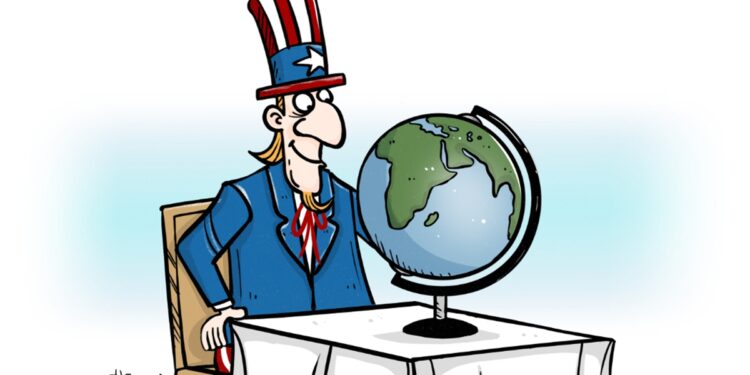Illustration: Chen Xia/GT
The “America First” agenda pursued by the new US administration is unfolding amid a string of executive orders and actions that have sparked fears and concerns in Africa. The intended withdrawal of the US from the World Health Organization will have devastating consequences for efforts to combat deadly diseases such as HIV/Aids, malaria and TB on the African continent.
For Sub-Saharan Africa, this is a matter of life and death, as the region is the epicenter of these diseases, accounting for nearly 60 percent of global HIV infections. Infant, child and maternal mortality rates are among the highest in the world. Africa is also on the frontlines of climatic devastation.Â
US President Donald Trump has also ordered the US withdrawal from the world’s main climate deal, the Paris Agreement, which covers climate change mitigation, adaptation and finance.Â
This will reduce Africa’s access to much-needed climate finance and technology to build climate resilience against frequent and severe floods and droughts.
The US is considered the world’s main contributor to human-caused climate change. Although Africa accounts for 4 percent of global greenhouse gas emissions, it is the continent least able to cope with climate change.
On the whole, critics on the African continent see the “America First” agenda as counterproductive and the surest route to further weaken America’s standing and presence in Africa. They see it as being in conflict with the “Make America Great Again” agenda.Â
America will not be seen as great and powerful on the global stage if it turns a blind eye to hunger, starvation and debilitating poverty still unfolding in parts of Africa.Â
A nationalistic approach will certainly weaken America’s standing in Africa. The new US administration comes into power at a time when the US influence in Africa is already on the decline. In soft power, a 2024 Gallup poll showed that China had already surpassed the US in popularity in Africa.Â
The militarization of the US foreign policy in Africa has failed and whatever was left between the US and Africa was held together by foreign aid. Signs that US diplomacy was failing includes being caught by surprise by the eruption of war in Sudan running from 2023 to 2024.Â
In East Africa, there has been growing concern over US interference in the internal affairs of these countries, and more so in Kenya, an economic powerhouse in the region.Â
Relations are currently tense between South Africa and the US, a powerhouse in the southern Africa region. The Trump administration has accused South Africa of human rights violations against white farmers, continuing a dispute that escalated recently as the US froze financial aid to the country.
South African Mineral and Petroleum Resources Minister Gwede Mantashe told a local broadcaster that the US bullying any country is not acceptable under any circumstances and that “a state of development must not be the basis of being bullied.
Some say cutting aid to Africa is reminiscent to cutting the umbilical cord and this will break the US-Africa ties but with far-reaching negative consequences for America on the global stage, as they are hellbent on ignoring Africa’s expanding role on the world stage. As the African continent increasingly strengthens its ties with China and, in recent years, has shown an affinity for Russia, these new executive orders and actions of the US will leave America increasingly isolated. A rapid expansion of BRICS on the global stage is to be expected. Africa, a sleeping giant, is about to wake up and find solutions among other key developing nations.
The author is a Kenya-based journalist. [email protected]
Source link : http://www.bing.com/news/apiclick.aspx?ref=FexRss&aid=&tid=67accf9942d54bf189f5d84e8e968ac8&url=https%3A%2F%2Fwww.globaltimes.cn%2Fpage%2F202502%2F1328314.shtml&c=9427471908436763256&mkt=en-us
Author :
Publish date : 2025-02-12 00:27:00
Copyright for syndicated content belongs to the linked Source.











